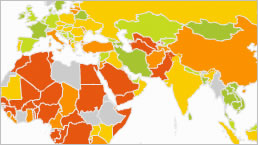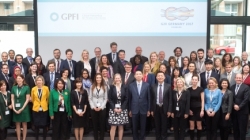
May 23, 2017 |
GPFI News
Following the 2017 GPFI Forum on May 2-3, the GPFI held its plenary in Berlin on May 4. Under a large participation of 80 GPFI member representatives, the G20 2017 Financial Inclusion Action Plan (FIAP) was approved.
Following the 2017 GPFI Forum on May 2-3, the GPFI held its plenary in Berlin on May 4. Under a large participation of 80 GPFI member representatives, the G20 2017 Financial Inclusion Action Plan (FIAP) was approved. Recognizing among others the mainstreaming of digitization and the importance of aligning the work of the GPFI with the 2030 Agenda for Sustainable Development, the 2017 G20 FIAP will guide the work of the GPFI in the coming years.
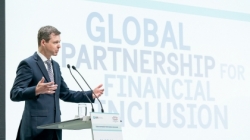
Aug 17, 2017 |
GPFI News
Under the German G20 Presidency, the annual GPFI Forum was held in Berlin on May 2-3, 2017. The 2017 GPFI Forum convened around 270 representatives from G20 and non-G20 member countries, global financial standard-setting bodies, banks, mobile network operators, FinTechs, think tanks, and civil society to discuss and exchange on a wide range of topics.

Jul 8, 2017 |
GPFI News
In the context of the German G20 Presidency, the GPFI and AFI hosted the 'High-Level Forum on the Financial Inclusion of Forcibly Displaced Persons (FDPs)' on 26 April 2017 in Berlin to discuss the challenges and potential solutions to provide and promote access to adequate financial services for FDPs.

May 23, 2017 |
GPFI News
G20 Finance ministers and central bank governors welcomed the G20 report on “Digital Financial Inclusion: Emerging Policy Approaches”, which examines how countries are implementing measures in line with the G20 High-Level Principles for Digital Financial Inclusion (HLPs)—aiming at catalyzing government actions to drive financial inclusion through a focus on digital technologies.
G20 Finance ministers and central bank governors, gathered in Washington on 20 and 21 April 2017, welcomed the G20 report on “Digital Financial Inclusion: Emerging Policy Approaches.” The report examines how countries are implementing measures in line with the G20 High-Level Principles for Digital Financial Inclusion (HLPs) published in 2016—aiming at catalyzing government actions to drive financial inclusion through a focus on digital technologies.
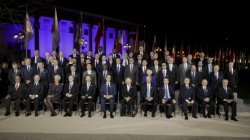
Mar 28, 2017 |
GPFI News
G20 Finance Ministers and Central Bank Governors gathered in Baden-Baden, Germany, committed to advance financial inclusion worldwide while supporting and recognizing the work of the GPFI.

May 23, 2017 |
GPFI News
The German Presidency hosted the GPFI Workshop "Climate smart financing for rural MSMEs – enabling policy frameworks" in Frankfurt. Participants discussed the question of how to design policies and regulations that help MSMEs to adapt to and strive in a context of a changing climate.
The German G20 Presidency hosted the GPFI Workshop "Climate smart financing for rural MSMEs – enabling policy frameworks" on 23 February in Frankfurt. Members of the Global Partnership for Financial Inclusion (GPFI) and representatives of international and other organizations met to discuss the question of how to design policies and regulations that help MSMEs to adapt to and strive in a context of a changing climate.

May 23, 2017 |
GPFI News
Hosted by the German Presidency on February 24, the G20 workshop “Helping SMEs Go Global - Moving Forward in SME Finance“, brought together more than 150 experts from G20 countries, development finance institutions, and the private sector to discuss issues related to advancing financial inclusion for SMEs.
Hosted by the German Presidency on February 24, the G20 workshop “Helping SMEs Go Global - Moving Forward in SME Finance“, brought together more than 150 experts from G20 countries, development finance institutions, and the private sector to discuss issues related to advancing financial inclusion for small and medium-sized enterprises (SMEs).
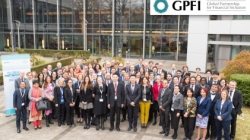
Mar 4, 2017 |
GPFI News
The meetings, held in Wiesbaden, included a workshop on revising the 2014 G20 Financial Inclusion Action Plan (FIAP), as well as the development of concrete steps to finalize the Subgroup Work Plans for 2017.

May 23, 2017 |
GPFI News
The conference focused on digitizing finance, financial inclusion and financial literacy. It drew a range of participants, from central bankers and government officials to representatives of the fintech industry and G20 country representatives.
High-level central bankers and government officials, fintech industry, G20 and non-G20 country representatives, along with delegates from international institutions, met in Wiesbaden on 25-26 January to explore developments in the domain of digital financial services.
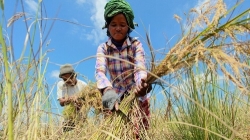
May 23, 2017 |
GPFI News
The German Presidency identified four priority areas for 2017, as well as scheduled key GPFI meetings and events in the coming year. Among other efforts, financial inclusion of forcibly displaced persons was identified as a priority.
In December Germany released its Global Partnership for Financial Inclusion German 2017 Priorities Paper. Priorities outlined in this key GPFI document include: (a) review and update of the GPFI Financial Inclusion Action Plan (FIAP): 2030 Agenda and digitization; (b) implementation of the G20 High Level Principles for Digital Financial Inclusion: opportunities and risks; (c) implementation of the G20 Action Plan on SME Financing; and (d) development of a work stream on financial inclusion of vulnerable groups: forcibly displaced persons.


